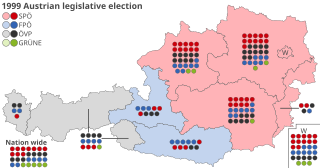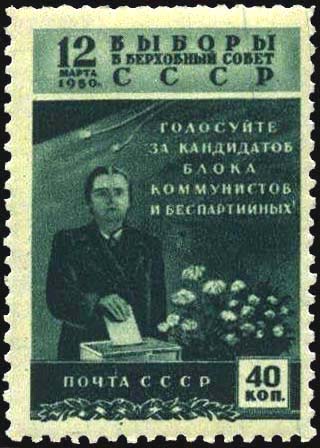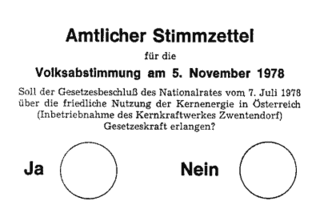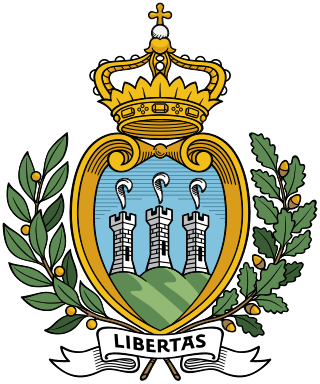The Liberals of Andorra is a conservative-liberal political party in Andorra. It is a member of the Liberal International and the Alliance of Liberals and Democrats for Europe.

Parliamentary elections were held in Austria on 3 October 1999. Although the Social Democratic Party remained the largest party in the National Council, a right-wing coalition government was formed by the Freedom Party of Austria (FPÖ) and the Austrian People's Party (ÖVP) after several months of negotiations. Although the FPÖ had finished a fraction of a point ahead of the ÖVP in the popular vote, ÖVP leader Wolfgang Schüssel became Chancellor rather than controversial FPÖ leader Jörg Haider. Haider, who had also been elected Landeshauptmann of Carinthia, was not appointed to the cabinet and resigned as party leader.

Parliamentary elections were held in Austria on 9 October 1994. The Social Democratic Party of Austria (SPÖ) and Austrian People's Party (ÖVP) remained the largest parties, but both suffered losses to minor parties. The Freedom Party of Austria (FPÖ) improved to 22.5% and The Greens won 7.3%. The Liberal Forum, a liberal splinter from the FPÖ, won 6.0% and entered the National Council on its first attempt. The incumbent grand coalition of the SPÖ and ÖVP was renewed.

Parliamentary elections were held in Austria on 6 March 1966. The result was a victory for the Austrian People's Party (ÖVP), which won 85 of the 165 seats. Voter turnout was 94%.
The Democratic Party is a centre-right political party in Bulgaria led by Alexander Pramatarski. The party was a member of the European People's Party (EPP).

The Lithuanian Peasants Party was a political party in Lithuania.
The Russian Party in Estonia was a minor political party in Estonia.

Early parliamentary elections were held in Moldova on 27 February 1994. They were the country's first competitive elections, and followed deadlock in Parliament over the issue of joining the Commonwealth of Independent States. The result was a victory for the Democratic Agrarian Party of Moldova (PDAM), which won 56 of the 104 seats.
Elections to the eleventh Supreme Soviet were held in the Soviet Union on 4 March 1984. They were the last in the Soviet Union to be held before Mikhail Gorbachev's policies of perestroika and demokratizatsiya resulted in partially free elections in 1989. They were also the last direct elections to the Supreme Soviet, as in 1989 deputies were elected to the Congress of People's Deputies, who then elected the Supreme Soviet.
Elections to the seventh Supreme Soviet were held in the Soviet Union on 12 June 1966.

Elections to the Supreme Soviet were held in the Soviet Union on 12 March 1950.

A referendum on the use of nuclear power was held in Austria on 5 November 1978. Voters were asked whether they approve a law allowing the peaceful use of nuclear power, particularly relating to the start-up of the Zwentendorf Nuclear Power Plant. Voters narrowly rejected it, with 50.5% voting against. As a result, although the Power Plant was finished, it was never operated and has been repurposed for various projects over the years.

General elections were held in Macedonia on 16 October 1994 to elect a President and Assembly, with a second round of Assembly elections on 30 October. The presidential election was won by Kiro Gligorov of the Alliance for Macedonia, whilst the parties forming Alliance for Macedonia also won the Assembly elections with 95 of the 120 seats. However, the second round of the Assembly elections were boycotted by VMRO-DPMNE and the Democratic Party, as they claimed there had been irregularities in the first round.

A referendum on the electoral law was held in San Marino on 3 July 2005. Voters were asked four questions on changes to the electoral law and electoral system. Although all four were approved by a majority of those voting, voter turnout was just 21.7%, meaning that the quorum of 32% of registered voters (10,143) was not achieved for any question. This resulted in all four questions failing, including two that proposed raising the quorum to 40%.
A two-part referendum was held in Switzerland on 23 May 1875. A new federal law establishing and certifying civil status and marriage was narrowly approved, whilst a new federal law on suffrage was narrowly rejected.
Ten referendums were held in Switzerland in 1976. The first two were held on 21 March on popular initiatives "for employees' participation", and "for taxation reform". The next three were held on 13 June on a federal law on spatial planning (rejected), a CHF 200 million loan to the International Development Association (rejected), and renewing unemployment insurance (approved).
Eleven referendums were held in Switzerland during 2001. The first three were held on 4 March on popular initiatives on joining the European Union, lowering medicine prices and lowering the urban speed limit to 30 km/h in most places. All three were rejected by voters. The next three referendums were held on 10 June on two separate amendments to the federal law on the Swiss army and on a federal resolution on abolishing the requirement for a permit to establish a diocese, all of which were approved.
Thirteen referendums were held in Switzerland during 1994. The first five were held on 20 February on federal resolutions on roadbuilding, continuing existing truck tolls and varying tolls based on engine power or mileage, as well as a popular initiative "for the protection of the alpine region from through traffic" and an amendment to the aeronautical law. All five were approved by voters. The second set of referendums was held on 12 June on federal resolutions on an article on the Swiss Federal Constitution on the promotion of culture and a review of the procedure for naturalising young immigrants, as well as a federal law on Swiss troops in peacekeeping operations. Whilst the resolutions were both approved by a majority of voters, they did not receive the approval from the majority of cantons, so were rejected, as was the law on troops.
Ten referendums were held in Switzerland during 1998. The first three were held on 7 June on a federal resolution on a balanced budget and two popular initiatives "for the protection of life and environment against genetic engineering " and "Switzerland without secret police". Whilst the balanced budget proposal was approved, both popular initiatives were rejected by voters. The next three referendums were held on 27 September on a federal law on truck tolls based on engine size and two popular initiatives "for well-priced foodstuffs and ecological farms" and "10th revision of the Aged and Bereaved Insurance without raising the retirement age". Whilst the toll law was approved, both initiatives were rejected.
Fifteen referendums were held in Switzerland during 2000. The first five were held on 12 March on reforming the judiciary and four popular initiatives; "for speeding up direct democracy ", "for a just representation of women in federal authorities", "for the protection of men against manipulations in procreation technology" and one to reduce motorised road by 50%. Whilst the judiciary reform was approved, all four popular initiatives were rejected. The next referendum was held on 21 May to authorise sectoral agreements between Switzerland and the European Union, and was approved by around two-thirds of voters.













